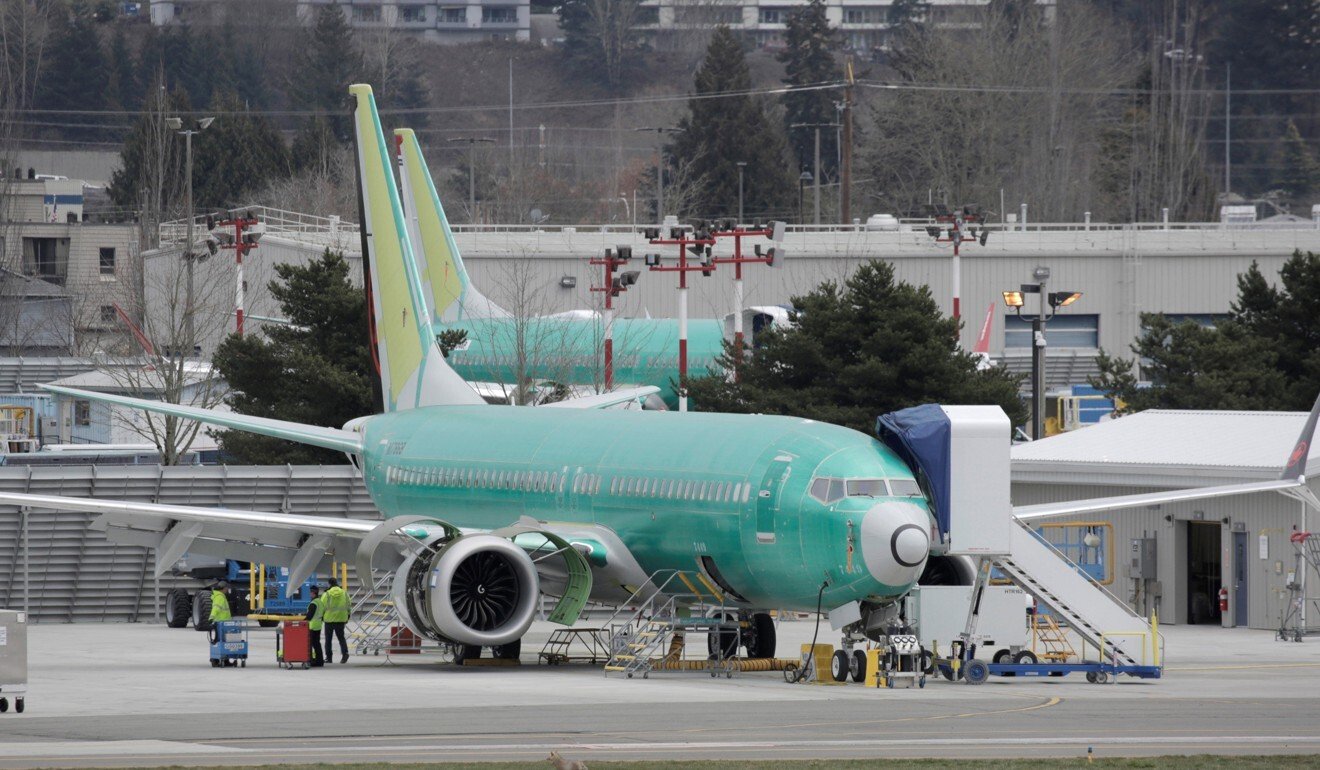China’s decision to ground Boeing 737 MAX 8 driven by safety concerns, not US-China trade war: experts say
- Civil Aviation Administration of China ordered domestic carriers to temporarily ground the aircraft after fatal Ethiopian Airlines crash on Sunday
- Likes of Singapore, Indonesia and Australia have also followed suit despite assurances from the US Federal Aviation Administration

China’s decision ordering domestic carriers to temporarily ground the Boeing 737 MAX 8 stems from safety concerns but any impact on the ongoing trade talks with the United States cannot be discounted, according to experts and analysts following Sunday’s fatal crash in Ethiopia.
Having bought a significant amount of the US company’s newest model, China led the pack of airline and aviation authorities in grounding the plane on Monday, a day after an Ethiopian Airlines 737 MAX 8 crashed, killing all 157 people on board.
The likes of Singapore, Indonesia and Australia have also followed suit after the same model crashed and killed 189 people in Indonesia in October despite the US telling international carriers this week that the US Federal Aviation Administration believes the Boeing 737 MAX 8 to be airworthy.
“China’s civil aviation authorities prioritise safety [above everything], and the aviation industry is the world’s most complex, fastest-growing business and most high pressure work environment,” Li Xiaojin, chief of the Civil Aviation University of China’s air transport economics institute, said on Tuesday during an online forum.
Li said the Civil Aviation Administration of China (CAAC) had judged that the pressure and disruption on carriers and travellers would be manageable, given that the 737 MAX 8 accounts for just 3 per cent of the nation’s total fleet.
The CAAC’s decision also broke with convention, as a suspension usually follows instructions from regulator in the country that certified the aircraft, in this case the US Federal Aviation Administration, which on Monday issued a “continued airworthiness notification”.
But at the commercial level, the grounding of the plane by Beijing is bad news for Boeing, since China is the company’s biggest and fastest growing market.
China’s aviation market is expected to overtake the US as the world’s largest by 2022, and the country is estimated to need over 7,000 planes in the next 20 years.
“While safety concern undoubtedly plays a role, it must be tempting for Beijing to have grounded the Boeing 737 MAX 8 to give itself a few more chips in the negotiations with the US on the trade war,” said professor Steve Tsang, director of the SOAS China Institute at the University of London’s School of Oriental and African Studies.
“It is kind of like killing two birds with one stone,” added Tsang, who said that it would only be a chip if it was cashed in during the negotiations.
While safety concern undoubtedly plays a role, it must be tempting for Beijing to have grounded the Boeing 737 MAX 8 to give itself a few more chips in the negotiations with the US on the trade war.
Professor Huang Jun from Beihang University, an aviation and aerospace university in Beijing, said Boeing was definitely an important factor in the US-China trade dispute and negotiations, but the decision to ground the 737 MAX 8 may not necessarily be a “chip” in those talks.
Chinese airlines currently account for 14 per cent of global traffic and are expected to grow to make up nearly 20 per cent in 20 years, according to Boeing’s projections. Boeing said it has received 4,700 international orders for the 737 MAX 8.
The plane entered service in 2017 and, as of January, Boeing has delivered 350 aircraft, with one of its top customers listed as Indonesia’s Lion Air, which was involved in the first fatal 737 MAX 8 crash in October. The MAX 8 variant of the 737 has bigger engines designed to use less fuel and is the chief rival to Airbus’ A320neo.
In China, domestic carriers currently operate 96 of Boeing’s 737 MAX 8, according to data from the Civil Aviation Resource Net of China, with more orders in the pipeline.

China, like Boeing, has much at stake given its ambition to build an indigenous long-haul airliner to wean off its reliance on the global manufacturing duopoly of Boeing and Airbus and help disentangle it form the political complications that entails.
The Commercial Aircraft Corporation of China (Comac) is accelerating its preparations for mass production of its C919 aircraft. Three further prototypes are undergoing testing in Shanghai, state media reported in February, and although it will be some time before the plane is commercialised, it could eventually rival Boeing and Airbus’ dominance.
Comac said it had so far received 815 orders, most which have come from Chinese airlines and aircraft leasing firms. But the C919 is not expected to enter operation until at least 2021.
Only 50 per cent of the components needed for the C919 are domestically produced at present, with the remainder including avionics made by foreign firms including Boeing.
Additional reporting by Amanda Lee